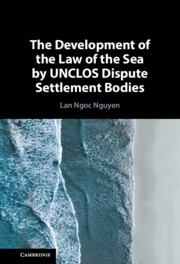Book contents
- The Development of the Law of the Sea by UNCLOS Dispute Settlement Bodies
- The Development of the Law of the Sea by UNCLOS Dispute Settlement Bodies
- Copyright page
- Contents
- Acknowledgements
- Table of Cases
- Table of Treaties and Documents
- Abbreviations
- 1 Introduction and Theoretical Framework
- 2 Coastal States’ Rights and Obligations under the Law of the Sea
- 3 Flag States’ Rights and Obligations under the Law of the Sea
- 4 Maritime Entitlement and Maritime Delimitation
- 5 Protection of the Marine Environment
- 6 Procedural Rules on Dispute Settlement
- 7 Contribution of UNCLOS Tribunals to the Development of the Law of the Sea
- Bibliography
- Index
7 - Contribution of UNCLOS Tribunals to the Development of the Law of the Sea
Published online by Cambridge University Press: 02 February 2023
- The Development of the Law of the Sea by UNCLOS Dispute Settlement Bodies
- The Development of the Law of the Sea by UNCLOS Dispute Settlement Bodies
- Copyright page
- Contents
- Acknowledgements
- Table of Cases
- Table of Treaties and Documents
- Abbreviations
- 1 Introduction and Theoretical Framework
- 2 Coastal States’ Rights and Obligations under the Law of the Sea
- 3 Flag States’ Rights and Obligations under the Law of the Sea
- 4 Maritime Entitlement and Maritime Delimitation
- 5 Protection of the Marine Environment
- 6 Procedural Rules on Dispute Settlement
- 7 Contribution of UNCLOS Tribunals to the Development of the Law of the Sea
- Bibliography
- Index
Summary
This final chapter first takes stock of the contribution of UNCLOS tribunals to the development of the law of sea, specifically assessing the areas of the law of the sea in which the contribution has been most prominent and the types of contribution that have been made, as well as the interpretative methods that UNCLOS tribunals have employed in the course of deciding their disputes or rendering advisory opinions. With the understanding that UNCLOS tribunals operate within a legal framework with constraints and limitations which impact the way they decide cases and thus the extent which they can contribute to developing the law, the chapter then explores the factors that help explain the decision-making process of UNCLOS tribunals and thus the room available for UNCLOS tribunals to take on the role of developing the law. These factors include the scope of jurisdiction that UNCLOS confers on the tribunals the institutional structure of UNCLOS and the expected and self-perceived roles of UNCLOS tribunals. Finally, the chapter offers some observations on whether there are major differences in the contribution of ITLOS and Annex VII tribunals to the development of the law of the sea.
Keywords
- Type
- Chapter
- Information
- Publisher: Cambridge University PressPrint publication year: 2023



